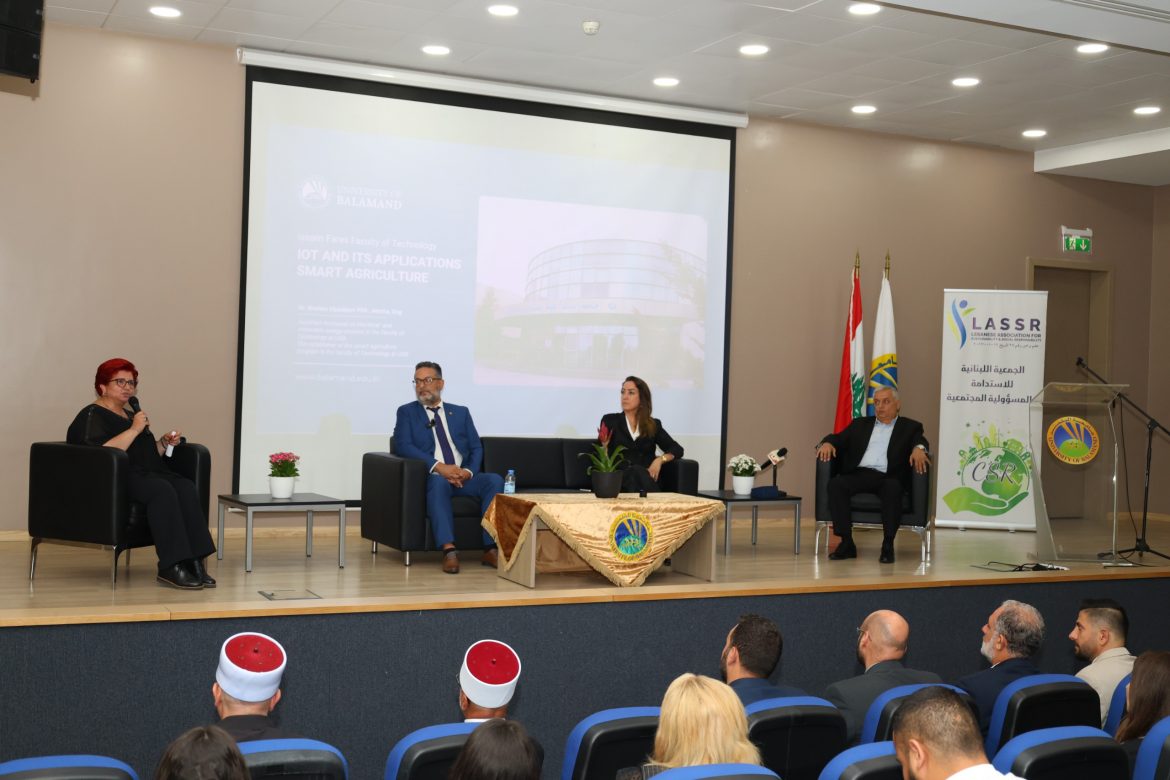Under the patronage of His Excellency the Minister of Agriculture, Dr. Nizar Hani, the University of Balamand, in collaboration with the Lebanese Association for Sustainability and Social Responsibility, organized a conference entitled “Social Responsibility: A Gateway to Sustainable Cities and a Greener Environment”. The event was held at the University’s Souk El Gharb Campus, marking the 30th anniversary of the founding of the Faculty of Health Sciences.
The conference was attended by Engineer Samer Al Khawand, representing Minister Dr. Nizar Hani; Dr. Huda Huijer, Dean of the Faculty of Health Sciences, representing the President of the University of Balamand, Dr. Elias Warrak; Dr. Ramona Al Danaf President of the Lebanese Association for Sustainability and Social Responsibility, Dr. Firas Zeidan the Secretary; and Dr. Habbouba Aoun, Director of the Souk El Gharb Campus. A number of experts and professionals in the fields of environment and sustainable development also took part, enriching the discussions with valuable insights and practical experience.
The conference addressed a range of critical topics related to environmental sustainability and social responsibility from multiple perspectives. Discussions began with the importance of waste management as a key pillar for achieving environmental sustainability, followed by the role of civil society as an active partner in building green cities. The vital contribution of universities in promoting environmental and social sustainability was also highlighted, along with the challenges and future opportunities in this field.
Environmental legislation was another key focus, with speakers exploring the current state of legal frameworks and the obstacles they face in supporting sustainable cities. The conference also featured sessions on sustainable transportation and its impact on creating eco-friendly urban environments, as well as practical case studies on smart agriculture as part of broader efforts to build sustainable green cities.
In his address, the representative of the Minister of Agriculture emphasized the importance of the conference, stating: “The theme of this conference is not merely academic or technical, it offers real hope for turning environmental and livelihood challenges into opportunities for constructive change.” He added: “As envisioned by Minister Hani, agriculture today is no longer just a traditional production sector, but a driver for rural development, a means to protect biodiversity, a strategic tool to address climate change, and a platform to strengthen partnerships between the state and society.”
Dr. Huijer noted, “We gather today for a special occasion, the 30th anniversary of the Faculty of Health Sciences at the University of Balamand.” She added, “At our faculty, we believe our role goes beyond academic education. It includes raising community awareness, fostering responsibility, and nurturing empathy and critical thinking.”
Dr. Zeidan, in his remarks, highlighted the role of universities in empowering students and guiding them to develop a strong sense of responsibility towards themselves, their communities, and the environment. “The well-being of future generations,” he said, “depends on our ability to act ethically toward the environment and natural resources, fight pollution and climate change, and contribute to economic development and improved living conditions, in line with the UN’s Sustainable Development Goals.”
Dr. Aoun spoke about the importance of the Department of Community Engagement, established in 1997: “Through this department, the University of Balamand has been committed to promoting sustainable development and active citizenship in Lebanon. The team continues to excel in applying the latest public health methodologies, development project management techniques, and evaluation practices to ensure high-quality outcomes for all stakeholders.”
This initiative stands as a clear reflection of the University of Balamand’s dedication to environmental sustainability and social responsibility. By bringing together experts, academics, and stakeholders, the University continues to lead efforts in raising awareness, encouraging collaboration, and nurturing a culture of responsible citizenship across Lebanon and the region.

